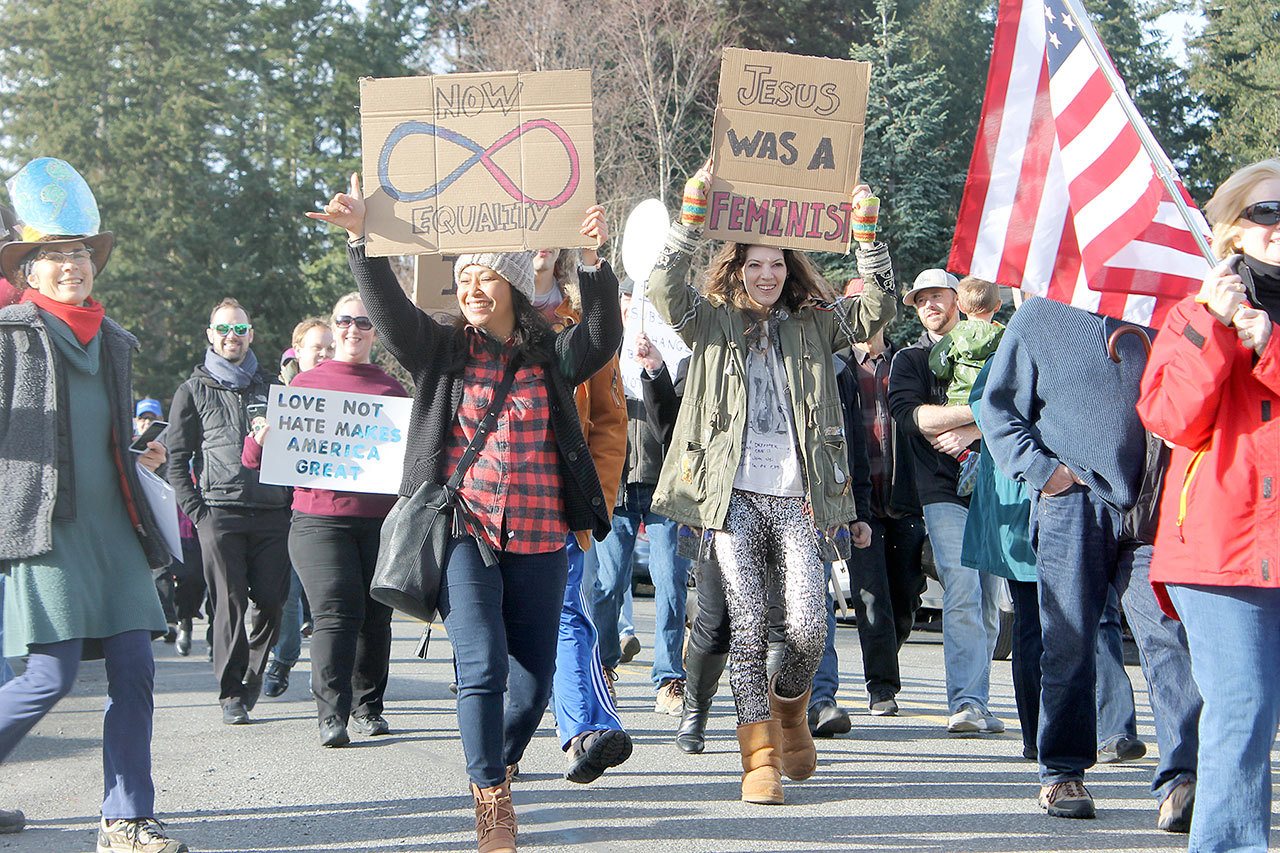Langley was host to perhaps the largest political demonstration in the city’s history on Saturday.
An estimated crowd of between 1,200 and 1,300 people marched for about two miles around the city to protest the views and agenda of President Donald Trump, just 24 hours after he was inaugurated. The sea of demonstrators included people of all ages and sexes, joined in solidarity to defend women’s rights, civil rights, LGBQT rights. They also marched in the name of inclusion and compassion for others and to oppose Trump’s rhetoric during his campaign. Many of the people wore pink hats, meant to represent those who support women’s rights.
Some hoped a message would be sent to the Trump administration itself.
“I am here because I want to show that I’m not afraid,” said Sunya Moss, an immigrant from Czech Republic who is now a United States citizen.
The protest coined “Women’s March, Langley, Washington” was peacefully conducted; no criminal incidents occurred, according to Langley Police Chief David Marks. Chants could be heard from the packs of protesters as they departed from Langley Middle School’s parking lot. The first leg of their journey took them from Sixth Street to De Bruyn Avenue, followed by First Street to Cascade Avenue. Many held signs with messages such as “Stop The War On Women” and “We Will Not Be Silent.”
Organizers Bernita Sanstad and Peggy Kimbell said they felt motivated to organize the event to provide South Whidbey residents with a protest in their backyard. It was also an opportunity to join a nationwide movement, they said.
They originally estimated around 50 people would participate as four bus loads of Whidbey residents were already scheduled go to the women’s march in Seattle. What they saw Saturday was shocking, to say the least.
“It exceeded all my expectations, absolutely,” Kimbell said.
The crowd was so large that at one point it stretched beyond the length of Sixth Street and was nearly impossible to capture in a single photo. The estimated participation also exceeds that of Langley’s population of 1,135.
Organizers and city officials said it was almost certainly the largest protest or demonstration Langley has ever seen.
“I can’t imagine there’s ever been a bigger one,” Marks said.
The protest was just one of many around the world on Saturday, as people joined together to defend women’s rights and human rights. Sanstad said she wasn’t interested in going to one of the big marches planned for places like Seattle, and that she wanted to organize an event in her hometown where people would be just as willing to step up.
“It was really important to me to show people around the world that we in small towns care about inclusion, justice and equality,” Sanstad said.
Among the crowd was 78-year-old Clinton resident Barbara Seely. When asked by a Record reporter how far she planned to march that day, she responded instead with a broader statement about the future, specifically the road ahead for the entire country.
“It’s going to be long,” said Seely, who said she has actively participated in protests throughout her lifetime. “Years.”
Other protesters, such as Langley resident Claire Williamson, also voiced concerns about the direction of the United States.
“I’m worried about what’s going to happen with minorities, with the LGBT community, with the environment — all of that,” Williamson said. “I just wanted to have my voice heard and step out here today.”
Williamson also said she was among those who are just now becoming more active politically, having been spurred on by Trump.
“There’s a lot of us like that, I think, that haven’t been very political but are now kind of getting the courage to step out and kind of got a fire under our butts,” Williamson said.
Langley resident Suzanne Jones said she hopes Trump will see how many people do not support his voiced agenda.
“The thing that I’m concerned about is that he won’t get the message,” Jones said.



